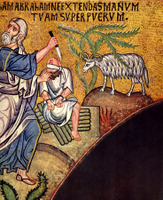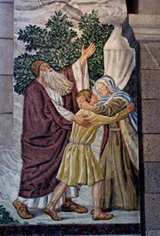 |
| God Restrains Abraham's Hand -- 12th century mosaic |
- Genesis 22:1-14 and Psalm 13 •
- Jeremiah 28:5-9 and Psalm 89:1-4, 15-18 •
- Romans 6:12-23 •
- Matthew 10:40-42
On this Sunday the continuous reading brings the story of
Abraham to the unnerving episode of his setting out to sacrifice Isaac. It is
such an extraordinary story that it has long prompted debate, and deep
perplexity. God grants the aging, childless Abraham an only son-- Isaac. It is
on Isaac that Abraham pours out all his love, and pins all his hopes. So how
could he possibly be willing to kill the being he most loves, and thereby
destroy all the hopes he has longed for? Even if we could leave the difficult
issue of the boy’s own well being aside, it is exceptionally hard to understand
Abraham's state of mind, still less sympathize with it. We can say what it seems we are supposed to
say -- that Abraham’s willingness to kill the child he adores reveals just how
great his devotion to God is. But isn't this one step too far? Doesn't such
devotion turn his 'faith' into fanaticism? And anyway, what does it say about
the God who would demand such a sacrifice?
 |
| Abraham and Isaac Return to Sarah - 20th century mural |
There is no easy
answer to these questions. One thing worth noting, though, is that the story
constitutes the essential Jewish background for understanding the sacrifice of
Christ on the cross. Christian liturgies describe this as a ‘full, perfect and
sufficient sacrifice’, meaning thereby to underline the futility of human
sacrifice. Even a sacrifice as overwhelmingly demanding as the one Abraham
seems willing to make, will never bridge the great gulf between God’s divine
holiness and our imperfect humanity. It is only an action in the opposite
direction -- from God to human beings – that can ever do this. As things turn
out, of course, Abraham is not in the end required to sacrifice Isaac. God
provides a ram, and the boy survives to perpetuate his father’s lineage. This
motif too, is reflected in the Christian narrative. It is only God who can
provide the sacrifice.
Though he is writing in a different context and to a
different purpose, in the Epistle
Paul has a similar thought in mind when he asks, "So what advantage did
you then get from the things of which you now are ashamed? The end of those
things is death." "Now that you have been freed from sin and enslaved
to God", he adds, "the advantage you get is sanctification. The end
is eternal life." As he says elsewhere, “The free gift of God is eternal
life in Christ Jesus our Lord”. Of course, though in sharp contrast to the
demand laid on Abraham, the gift is free, we have to see that this is so, and
accept it.
No comments:
Post a Comment